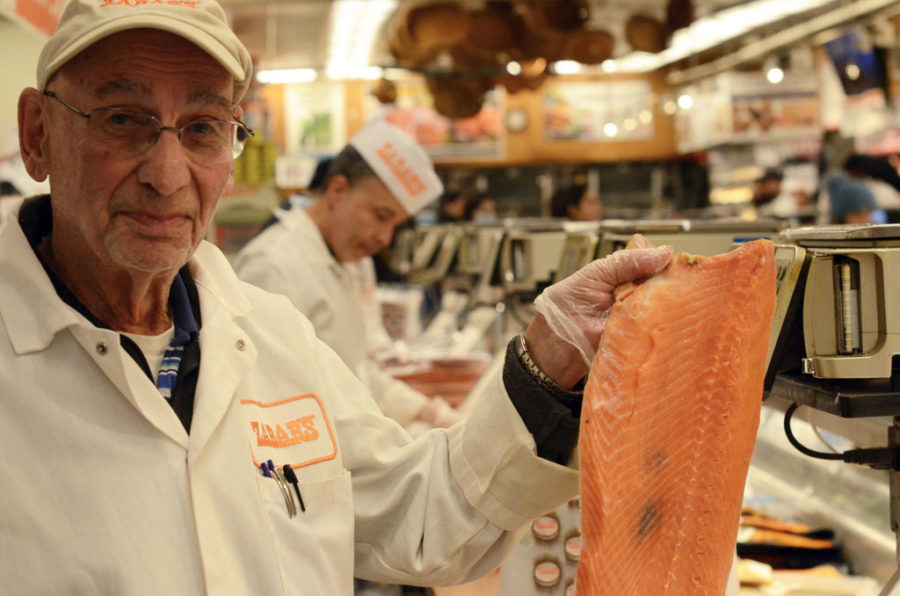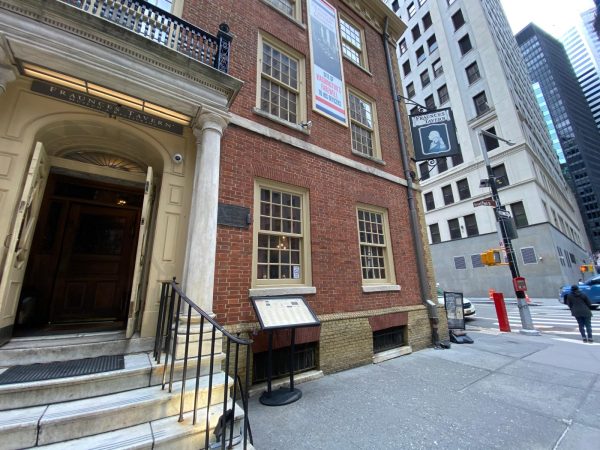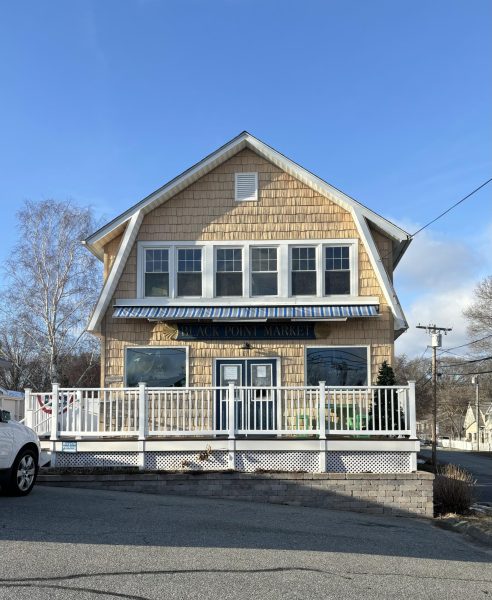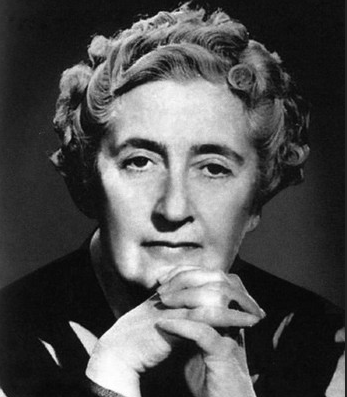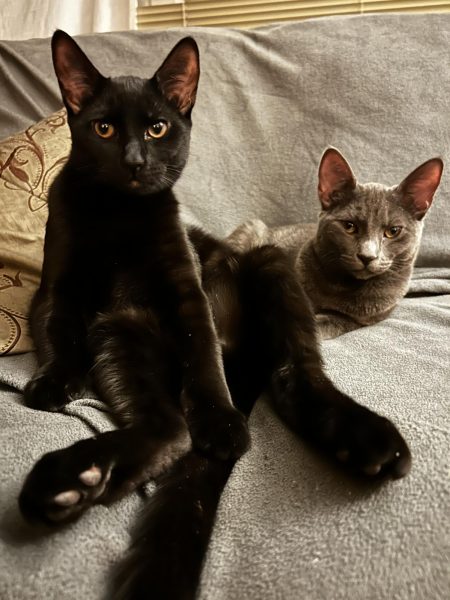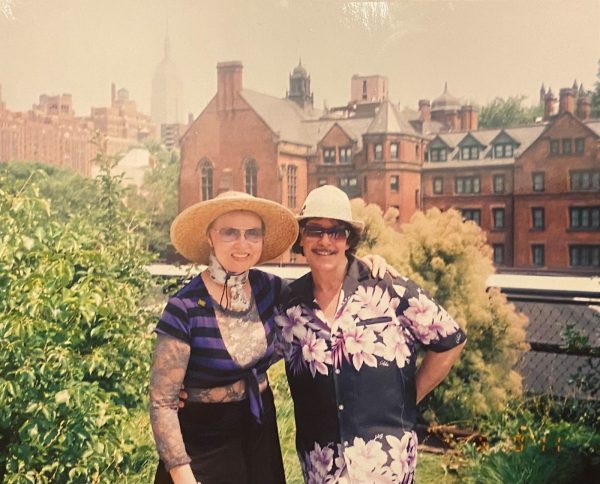‘The People Thing’: A Profile of Zabar’s Lox Whisperer Len Berk
Instead of settling down in his retirement, Len Berk decided to pick up a fillet knife.
Len Berk has worked as a slicer behind the Zabar’s fish counter since retiring from a job in accounting almost 30 years ago. “We all have regulars behind the counters,” Berk said. “They get used to the way we slice.”
If you ask an Upper West Sider what establishments define their neighborhood, Zabar’s is likely to be at the top of their list. Founded in 1934 by Louis Zabar, a Ukrainian Jewish immigrant who fled Russian pogroms, Zabar’s has become an Upper West side institution, both for New York Jews and all New Yorkers. Its iconic orange lettered signage and crowded windows have been a mainstay for generations, despite the quick turnover of businesses in New York.
Today, Zabar’s stocks items like babka, kugel, and kosher packaged foods alongside plenty of Italian prosciutto, smoked ham, and more. “Zabar’s has that homey feel of a traditional Jewish deli while providing enough options to satiate any palate,” said Manhattan native Levi Miller ’24.
When I was younger, my dad would always stop by the fish counter to pick up a bit of lox while running errands. Zabar’s was (and still is) his favorite epicurean establishment. He loves the hustle and bustle, and the shouts of slicers behind the counter. Afterwards, we’d pop next door to the Zabar’s cafe, where I would enjoy a bagel with cream cheese and an orange juice. Today, it’s still my go-to order.
Lox, though originally Scandinavian, has become a staple of American Jewish cuisine. The thinly sliced salmon is cured in salt brine, which was historically used to keep fish preserved prior to the advent of refrigeration. Today, many New Yorkers enjoy lox on a bagel with cream cheese. Bagels arrived in the U.S. via Ashkenazi Jewish immigrants in the late 19th century.
Salty salmon, tangy cream cheese, and doughy bagels form a dynamic trio. As Heather Smith, author of A Fish and Bread Journey: The Natural and Social History of Bagels and Lox, puts it, “what’s certain is that bagel met and married lox in New York.”
On a cold and rainy December evening, I stepped into Zabar’s for the first time since before the COVID-19 pandemic. Though it was emptier than I remembered, the bustling atmosphere, warm fluorescent lighting, and wonderfully overcrowded shelves remained the same. I had been instructed to meet at “the Southeast corner of the counter,” so I made my way over, scanning for the face I had now seen in countless articles.
“Oh!” he said. “You’re here for the interview, right?”
Len Berk discarded his gloves, stepped out from behind the counter, and motioned for me to follow him upstairs. We sat down in a conference room at the back of the housewares department. The room was mostly bare except for a table and chairs, and a few assorted framed pictures — an illustration of a salmon sat on top of a filing cabinet; a blueprint of the store rested against the wall.
Born in Brooklyn and raised in the Bronx, Zabar’s lox slicer Len Berk, 93, has held many jobs throughout his life. As a teen, he worked as a chicken plucker and a soda fountain operator (known as a soda jerk.) After that, Berk was stationed at Letterman Army Hospital in San Francisco during the Korean War. “I was very lucky. They had me working accounting, so I never saw action,” he told me, still wearing his uniform and Zabar’s hat.
Berk’s main career was in accounting — a job he held for over 30 years. Though it paid the bills, he never found himself quite satisfied. At age 60, he sold his accounting business. From there, he turned to a career in food.
Berk’s passion for East Asian cuisine became a job. For two years, he organized and led gourmet dining tours in Hong Kong. “They were two of the most exciting years that I can recall,” he said.
But how did Berk find his way to the Zabar’s lox counter? The answer is quite simple. “A friend called me and said Zabar’s was looking for a lox slicer,” he told me. “ I said ‘I could do that’ so I sent an e-mail to Saul Zabar saying ‘I’d like to slice lox for you.’ I told him ‘as far as my experience goes,‘I’m honest, I’m personable, and I was a Zabar’s customer who would buy half sides of salmon because I enjoyed slicing it myself.’ Saul said, ‘Well, come on down we’ll take a look at you.’”
“I came on down in my business suit. Saul said ‘come in on Friday, we’ll put you behind the counter and see what you can do.’ That Friday, he introduced me to David Yan, who was a slicer at the counter. Yan was a man of very few words — he looked at me and said ‘watch.’ And I’ve been here ever since.”
Slicing has become second nature to Berk. It’s a deeply sensory experience — he loves smoothing his hands over the cool, oily surface of the fish. But some tasks are more challenging than others. “Filleting a whitefish, that’s what’s tricky,” he said.

In the past few years, Berk has had to take on a different kind of challenge: life as a celebrity.
“The Forward did an article on me about 10 years ago. It was quite a shock. I knew they were doing an article about me but when I came to work one day and I looked at the newsstand, I saw my picture on the front page of a newspaper,” he said. “That was staggering.”
Since the publication of the Forward’s article, numerous news sources, including NPR, CBS News, StoryCorps, and the NY Post have published pieces on Berk. Now, instead of simply having regulars, he has his fair share of admirers, too. “I find that so amazing — people stop me in the street,” he said. “These things add a spark to life. When I was an accountant, I thought that was it. But the next part was the best part of my life, after I sold my accounting practice and did the tours and Zabar’s, and who knows what’s next.”
At the height of the COVID-19 pandemic, Berk was laid off. He wrote about the experience for the Forward in an article called “The unkindest cut: Last call for a Zabar’s lox slicer.” Saul Zabar (his supervisor), concerned for his health, told Berk he didn’t want him to come into work for a little while. “I love you, but you’re over 90 years old and you’re in the group that is most susceptible to the virus and if you got it, if anything happened to you, I could never forgive myself,” Saul had said. Though Berk understood the risks, it was still an incredibly difficult adjustment.
As it turned out, lox slicing wasn’t the only passion Berk discovered in his later years.
“If it wasn’t for COVID, I wouldn’t have been laid off; I never would’ve had the time on my hands — I never would have discovered my talent for writing,” he explained.
Berk is now a regular columnist for the Forward (formerly known as the Jewish Daily Forward), which is one of America’s oldest Jewish newspapers. He is affectionately called their “lox columnist.” In articles like “The sturgeon will see you now — an expert’s guide to smoked fish” and “The 16 customers you’ll meet at the Zabar’s lox counter,” he chronicles his experiences and lessons learned both in his time as a lox slicer and beyond.
“I love writing,” he explained. “I start writing and I don’t stop — even if I don’t like the way I said it, I just keep going. Then after I finish a page, I’ll go back and read it, and I’ll take this out, put that in, change a word here or there. It’s a building process; it’s a putting together of odds and ends in a way that suits me — and it’s ever changing. When I was a CPA, organization was very important and now for me, that takes its place in writing.”
He finally returned to work in the summer of 2021, though his shift was cut down from 2 days a week to one. “It’s not easy to stand and slice from 11 a.m. to 7 p.m.,” said Berk. Despite the challenge, he was glad to return. “A lot of people missed me when I was gone. I was out for a year and a half. But when I came back it was like I had never left.”
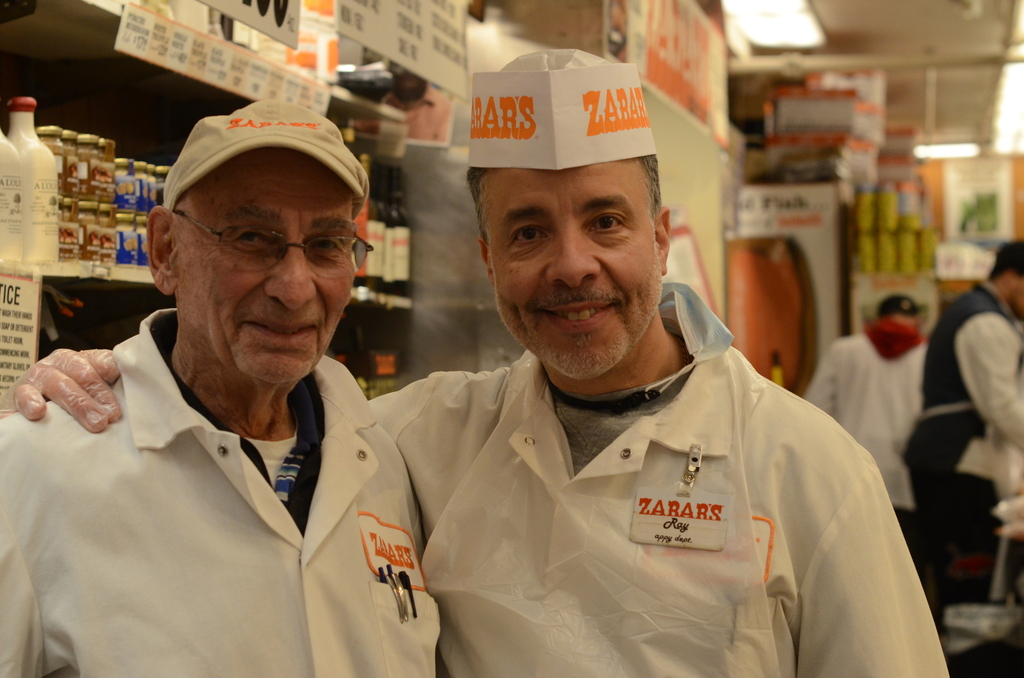
For Berk, human connection is what has kept him going. “I never liked accounting, but it was the people thing. I’ve always managed to be involved with the people around me. I enjoyed the people I worked with.”
“I never thought I would be around at 93. It’s different from being 83, 73. Your body changes, your brain works less well. I find I look for words. I think work is very important — I want to work as long as I can,” Berk said, pausing. “People ask me if I’m going to retire. I don’t plan to retire until I have to.”
Now, instead of simply having regulars, Berk has his fair share of admirers, too. “I find that so amazing — people stop me in the street,” he said. “These things add a spark to life. When I was an accountant I thought that was it. But the next part was the best part of my life, after I sold my accounting practice and did the tours and Zabar’s, and who knows what’s next.”
Nora Sissenich is an Editor-In-Chief for 'The Science Survey,' a role that she values deeply because it allows her to offer guidance and insight through...

